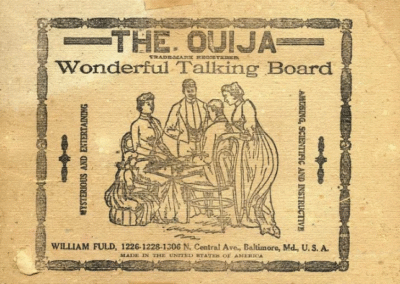The Ouija Board: More Than a Game
Whether you see it as a party trick or a portal to something darker, the Ouija board has a reputation that’s hard to ignore. Its origin traces back to the 19th century, when grief and belief collided in the Spiritualist movement; a time when families longed to speak to their dead. By the late 1800s, séances were commonplace but slow and clunky. That’s where the “talking board” came in: a quicker, more direct way to speak to the other side.
In 1890, businessman Elijah Bond patented the first version of the Ouija board. Still, it was William Fuld who turned it into a household name. Marketed as a mystical tool and a fun novelty, the board quickly moved from séance tables to toy shelves. By the time Parker Brothers and later Hasbro got involved, the Ouija board was sitting right next to Monopoly and Life — except this game came with rules you’d be wise not to break.
For skeptics, it’s just the ideomotor effect: tiny subconscious movements making the planchette appear to move on its own. But for believers, the board is something more. Something dangerous. And the stories behind it, those are what give the Ouija board its chilling legacy.
Take, for example, the real case that inspired The Exorcist. In 1949, a quiet 13-year-old boy, known by the alias “Roland Doe,” began using a Ouija board after the sudden death of his aunt, a Spiritualist who had introduced him to the practice. He tried to contact her. What followed was not a heartfelt reunion. Instead, the family began hearing scratching noises, furniture moved on its own, and religious objects flew off the walls. The boy’s behavior shifted to trance states, guttural voices, violent outbursts, and aversion to anything religious.
After failed attempts with doctors and ministers, the family turned to the Catholic Church. Roland was brought to St. Louis, where two Jesuit priests performed more than 30 exorcisms. Witnesses reported levitations, physical attacks, and scratch marks spelling out words like “Hell” on his skin. The story eventually reached author William Peter Blatty, who fictionalized it into The Exorcist. But behind the spinning heads and Hollywood effects was a real child — and a session with a Ouija board that no one could ever explain.
The fear surrounding the board only intensified after the movie’s release. It became a symbol of danger, no longer just a spooky sleepover prop. Religious groups denounced it. Psychologists cautioned against its use. And yet, the board never disappeared — it adapted, showing up in everything from Ghost Adventures to T-shirts and mobile apps.
Then came Zozo.
The name Zozo has become infamous in paranormal circles. It often starts with the board sliding quickly between Z-O-Z-O, over and over again. Users report feeling nauseous, terrified, or even attacked. Some say the entity follows them after the session ends. One of the most well-known encounters comes from Darren Evans, who documented terrifying experiences involving nightmares, shadow figures, and the deaths of two close friends. Whether Zozo is a demon, an urban legend, or a reflection of our own anxieties, the consistency of these reports is hard to ignore.
But not all encounters are so dramatic. Some, like the case of Alexandra Huerta in Mexico, blur the line between spiritual and psychological. In 2014, Huerta was caught on video laughing manically, speaking in a deep voice, and writhing on a stretcher after using a Ouija board. Later, it was revealed that she had ingested Brugmansia, a hallucinogenic plant used in local rituals. Medically, it was called intoxication. But culturally, many still believe something came through.
And then there are the crimes.
Over the decades, the board has been connected to some alarming acts: a woman murdered because the board said she was a witch; a teen who killed his friend and blamed the board; two boys who asked it whether they should become serial killers — and it said yes. Whether these are the results of mental illness, suggestibility, or something darker, they form a pattern of real-world consequences tied to what is often still marketed as a toy.
Science has weighed in, too. A recent study found that users who already believed in the supernatural experienced a spike in anxiety after using the board, up to 25% higher than baseline levels. Another study revealed that when users thought they were guessing, they answered questions more accurately through the board than through conscious guessing, suggesting a deeper tap into unconscious memory. So maybe the board isn’t talking to ghosts … but it’s definitely talking to something.
Even poets have found inspiration in the board. James Merrill, a Pulitzer Prize–winning poet, wrote entire works based on messages he claimed came through Ouija sessions. Literary scholars like Langdon Hammer have argued that the board mirrors the creative process: part control, part surprise, something summoned from within that feels like it comes from beyond.
As for the experts? The world’s leading Ouija historian, Robert Murch, doesn’t dismiss the board’s power. He’s spent decades collecting its history, tracing its origins, and advising filmmakers and museums. He believes the board “works” — whether it’s through spirits, psychology, or suggestion. And he warns that its messages can feel all too real for the emotionally vulnerable.
In the end, maybe the Ouija board doesn’t summon the dead. Maybe it summons us — our fears, our memories, our traumas. And in doing so, it shows us something we weren’t ready to see.
So… should you use a Ouija board?
That’s your call. But if you do, don’t treat it like a toy — treat it like a loaded question. The rules are more than superstition.
Before you even touch the planchette, remember these:
1. Never use it alone — You don’t want to open a door without someone to pull you back.
2. Always say goodbye — It’s how you hang up the call. Leave the session open, and something else might finish the conversation.
3. Don’t use it in your home — If something crosses over, you don’t want it settling in.
4. Never ask about death — Spirits lie. And fear is easy to weaponize.
5. Don’t provoke — Mocking or challenging whatever answers you get is an invitation you might regret.
6. Avoid spirits that spell Z-O-Z-O (or repetitive names like MAMA) — This is your sign to stop immediately.
7. Cleanse the board — Physically and spiritually, before and after use. Salt, sage, holy water — whatever keeps your peace.
8. Use a designated reader — One person should guide the session to avoid chaos and confusion.
9. Don’t play when you’re emotionally vulnerable — Grief, fear, anger; these are magnets for whatever might be listening.
10. Never leave the planchette on the board — It’s a symbol, yes. But one that says: “I’m still listening.”
These rules won’t guarantee safety.
But they’re better than going in blind.
Because if the board really does open a door, you’ll want to know how to close it.
Comment your experiences below.
Resources
1. Cosmopolitan — “Friends Possessed After Playing Ouija”
https://www.cosmopolitan.com/entertainment/news/a27561/friends-possessed-from-ouija-board-irl/
2. Darren Evans’ Paranormal Blog — ZOZO Lore
https://darrenevansparanormal.blogspot.com/
3. Dictionary of Witchcraft — Collin de Plancy
4. Escolà-Gascón, Á., Dagnall, N., & Denovan, A. (2025). Increase in reported anxiety and anomalous experiences in paranormal believers following Ouija board play. Psychology of Consciousness: Theory, Research, and Practice.
https://doi.org/10.1037/cns0000415
5. Etymology Online — “Ouija”
https://www.etymonline.com/word/Ouija
6. Hammer, L. (2022). The Talking Board: Ouija, Wordplay, Poetics. Chicago Review, 66(2), 119–140.
7. NT News — Alexandra Huerta Case
https://www.ntnews.com.au/…/news-story/dd05647f8a8c7a6e65b34a336eab906d
8. Reader’s Digest — “10 Chilling Crimes Involving Ouija Boards”
https://www.rd.com/list/chilling-crimes-involving-ouija-boards/
9. Reddit — r/Ghosts Ouija Thread
https://www.reddit.com/r/Ghosts/comments/t54wb2/people_who_have_used_a_ouija_board_whats_the/
10. Robert Murch — Ouija Historical Reference Archive
https://robertmurch.com/references/
11. Rensink, R. A., et al. — Consciousness and Cognition (Ouija & Cognition)
https://www2.psych.ubc.ca/~rensink/publications/download/Ouija-GRF.pdf

Dive into the chilling world of horror literature and explore spine-tingling tales crafted by Samantha Almeida. Follow me on social media for the latest updates, exclusive content, and a community of fellow horror enthusiasts. Remember, the shadows are always watching—stay connected and keep the scares alive!
Home | About | Services | Privacy Policy

